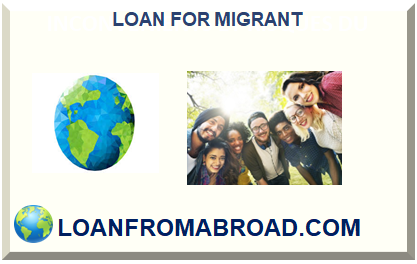
LOAN FOR MIGRANT 2024
LOAN FOR IMMIGRANT WORKER IN USA UK CANADA AUSTRALIA GERMANY
A loan for migrant in 2024 is by definition a financial arrangement where individuals who have migrated to a new country such as USA, UK, CAnada, Australia or Germany, or are in the process of immigrating can borrow money from financial institutions, lenders, or specialized programs to meet various financial needs. These loans are designed to assist migrants in covering expenses such as settling into their new country, covering education costs, purchasing a home or vehicle, starting a business, or addressing unforeseen financial challenges. The loans can play a crucial role in providing financial stability and support to immigrants during their transition and integration into a new society.
The loan for migrant has the primary usefulness in its ability to address the unique financial requirements of immigrants in their host countries. These loans can help cover essential expenses, support educational pursuits, and facilitate entrepreneurship, all of which contribute to the economic and social integration of migrants.
The loan for immigrant worker has the role to bridge the financial gap that immigrants may face due to factors like limited credit history, foreign income sources, or unfamiliarity with the local financial system. The objectives are to empower migrants to achieve financial self-sufficiency, establish a stable life in their new country, and contribute positively to their host nation's economy and society.
The loan for migrant in 2024, however is not always a good funding option depends on individual circumstances and careful consideration. While these loans can provide essential financial support, they may come with specific terms, interest rates, and fees. Migrants should evaluate their financial capacity to repay the loan, understand the terms and conditions thoroughly, and explore alternative sources of funding or assistance, such as grants, scholarships, or community resources. Responsible borrowing and financial planning are essential to ensure that loans for migrants serve their intended purpose without leading to undue financial strain.
What are the eligibility criteria for obtaining a loan as a migrant or immigrant?
Eligibility Criteria for Obtaining a Loan as a Migrant or Immigrant
When applying for a loan as a migrant or immigrant worker, you'll need to meet specific eligibility criteria set by lenders or financial institutions. These criteria may vary depending on the lender and the type of loan you are seeking. Here are common eligibility factors to consider:
- Immigration Status: Lenders often require proof of your immigration status or legal residency in the host country. Some loans may be available to individuals with different immigration statuses, so check with the lender for details.
- Proof of Identity: You will need to provide a valid government-issued ID, such as a passport or national ID card, to verify your identity.
- Proof of Income: Lenders typically require evidence of stable income. This may include pay stubs, employment contracts, or other income-related documents.
- Credit History: While some loans are available to individuals with no credit history, having a positive credit history in the host country can improve your loan eligibility and terms.
- Residency Duration: Some lenders may have a minimum residency duration requirement to qualify for a loan. They may want to see that you have established a stable presence in the country.
- Collateral (if applicable): For certain types of loans, such as home mortgages or car loans, lenders may require collateral, such as property or assets, to secure the loan.
- Loan Purpose: The purpose of the loan may affect eligibility. For example, educational loans may have different criteria than personal loans or business loans.
- Legal Age: You must be of legal age in the host country to enter into a loan agreement. The minimum age requirement varies by location.
It's essential to review the eligibility criteria of specific lenders and loan programs. Different lenders may have varying requirements, and some organizations specialize in serving migrant and immigrant communities, offering loans with more flexible criteria. Additionally, maintaining a stable income, building a positive credit history, and seeking financial advice can enhance your eligibility and access to loans in your host country.
OVERSEAS STUDENT LOAN CHRISTMAS LOAN LOAN BROKER OVERSEAS PRIVATE LOAN WITH GUARANTEE OVERSEAS MORTGAGE BUSINESS LOAN PERSONAL LOAN TAX ON LOANS WITHOUT COLLATERAL MICROFINANCE P2P LOAN CAR LOAN WITHOUT CREDIT CHECK CREDIT CARD DEBT CONSOLIDATION WITHOUT JOB WITH BAD CREDIT WITHOUT UPFRONT FEE FOR DISABLED ISLAMIC LOAN LIST OF BROKER LEASING FROM ABROAD LOAN FROM OVERSEAS BANK CHINA THAILAND EUROPE FOR MIGRANT FOR WOMEN CAR FOR FOREIGNER ELECTRIC BIKE LOAN STUDENT LOAN REPAYMENT FROM ABROAD LOAN FROM INDIAN OVERSEAS BANK FOR MASTER LOW INCOME LOAN OVERSEAS CROWDFUNDING FOR FARMER OVERSEAS PAYDAY LOAN WITH NEGATIVE RATE OVERSEAS BANK ACCOUNT OFFSHORE BANK ACCOUNT ANONYMOUS BANK ACCOUNT OFFSHORE BANK ACCOUNT ANONYMOUS BANK ACCOUNT GERMANY LOAN SWISS BANK ACCOUNT LUXEMBOURG ACCOUNT PANAMA ACCOUNT DUBAI BANK ACCOUNT LOAN FOR US CITIZEN LOAN FOR BRITISH SWITZERLAND LOAN MORTGAGE FOR ALIEN LOAN FOR HOUSEWIFE FOR FOREIGNER UK LOAN LIST OF GERMAN BANKS KREDIT OHNE SCHUFA USA LOAN AUSTRALIA LOAN FRANCE LOAN BELGIUM LOAN NO PROOF OF INCOME WITHOUT INTEREST START-UP LOAN MAURITIUS MOROCCO NEW ZEALAND LIST OF SWISS BANKS LUXEMBOURG LOAN LIST OF UK CAR LEASING MONACO LOAN SAUDI ARABIA QATAR LOAN FROM GOVERNMENT ANDORRA LOAN FOREIGN INSURANCE FOREIGN CAR INSURANCE FOREIGN HEALTH CARE FOR EXPATRIATE FOR CROSS-BORDER FOR NRI BLACKLISTED LOAN MOTORBIKE LEASING LICHTENSTEIN LIST OF INTERNATIONAL BANKS CANADA LOAN WITHOUT SCHUFA ISRAEL LOAN ITALY MORTGAGE DUBAI LOAN LOAN FOR REFUGEE LEASING FOR FOREIGNER SPAIN PORTUGAL LEASING GERMANY BKR LOAN